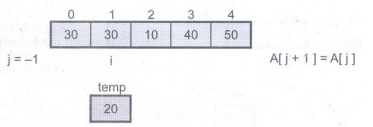Data Structure: Unit V (a): Searching and Sorting
Insertion Sort
Operations, Advantages, Algorithm with Example C Programs | Data Structure
In this method the elements are inserted at their appropriate place. Hence is the name insertion sort.
Insertion Sort
In this
method the elements are inserted at their appropriate place. Hence is the name
insertion sort. Let us understand this method with the help of some example -
For Example
Consider
a list of elements as,

The
process starts with first element

Algorithm
Although
it is very natural to implement insertion using recursive(top down) algorithm. but
it is very efficient to implement it using bottom up(iterative) approach.
Algorithm Insert_sort(A[0...n-1])
//Problem
Description: This algorithm is for sorting the
//elements
using insertion sort
//Input:
An array of n elements
//Output:
Sorted array A[0...n-1] in ascending order
for i←1 to n-1
do
{
temp←A[i]//mark
A[i]th element
j←i-1//set
j at previous element of A[i]
while(j>=0)AND
(A[j]>temp)do
//comparing
all the previous elements of A[i] with
//A[i].If any greater element is found then
insert
//it at
proper position
A[j+1] ← A[j]
j←j-1
}
A[j+1] ←
temp
//copy A[i] element at A[j+1]
}
Advantages of insertion sort
1.
Simple to implement.
2. This
method is efficient when we want to sort small number of elements. And this
method has excellent performance on almost sorted list of elements.
3. More
efficient than most other simple O (n2) algorithms such as selection sort or
bubble
sort.
4. This
is a stable (does not change the relative order of equal elements).
5. It is
called in-place sorting algorithm (only requires a constant amount O(1) of
extra memory space). The in-place sorting algorithm is an algorithm in which
the input is overwritten by output and to execute the sorting method it does
not require any more additional space.
Let us
now see the implementation of this method using C.
Ex. 6.5.1: C program sorting elements using
insertion sort.
Sol. :
/*************************************************************
Implementation
of insertion sort
*************************************************************/
#include<stdio.h>
#include<conio.h>
void
main()
{
int
A[10],n,i;
void
Insert_sort(int A[10],int n);
clrscr();
printf("\n\t\t
Insertion Sort");
printf("\n
How many elements are there?");
scanf("%d",
&n);
printf("\n
Enter the elements\n");
for(i=0;i<n;i++)
scanf("%d",
&A[i]);
Insert_sort(A,n);
getch();
}
void
Insert_sort(int A[10], int n)
{
int
i,j,temp;
for(i=1;i<=n-1;i++)
{
temp
=A[i];
j=i-1;
while((j>=0)&&(A[j]>temp))
{
A[j+1]=A[j];
j=j-1;
}
A[j+1]=temp;
}
printf("\n
The sorted list of elements is...\n");
for(i=0;i<n;i++)
printf("\n%d",A[i]);
}
Output
Insertion
Sort
How many
elements are there?5
Enter
the elements
30
20
10
40
50
The
sorted list of elements is
10
20
30
40
50
Logic Explanation
For
understanding the logic of above C program consider a list of unsorted elements
as,

Then the
control moves to while loop. As j >= 0 and A[j] > temp is True, the while
loop will be executed."

Now
since j >= 0 is false, control comes out of while loop.

Then
list becomes,

Thus we
have scanned the entire list and inserted the elements at corresponding
locations. Thus we get the sorted list by insertion sort.
Ex. 6.5.2: Write a routine for insertion sort.
Sort the following sequence using insertion sort. 3, 10, 4, 2, 8, 6, 5, 1.
Sol. We will store the elements
in an array.

The
process will start from the first element.

Data Structure: Unit V (a): Searching and Sorting : Tag: : Operations, Advantages, Algorithm with Example C Programs | Data Structure - Insertion Sort
Related Topics
Related Subjects
Data Structure
CS3301 3rd Semester CSE Dept | 2021 Regulation | 3rd Semester CSE Dept 2021 Regulation
